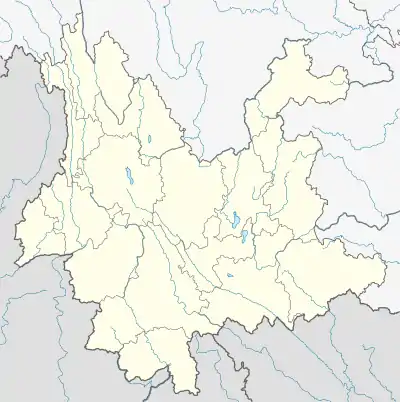Weiyuan Town
威远镇 | |
|---|---|
 Weiyuan Town Location in Yunnan. | |
| Coordinates: 23°30′09″N 100°42′27″E / 23.50250°N 100.70750°E | |
| Country | People's Republic of China |
| Province | Yunnan |
| Prefecture-level city | Pu'er City |
| Autonomous county | Jinggu Dai and Yi Autonomous County |
| Area | |
| • Total | 1,127 km2 (435 sq mi) |
| Elevation | 1,320 m (4,330 ft) |
| Population (2020) | |
| • Total | 82,289 |
| • Density | 73/km2 (190/sq mi) |
| Time zone | UTC+08:00 (China Standard) |
| Postal code | 666400 |
| Area code | 0879 |
Weiyuan (simplified Chinese: 威远镇; traditional Chinese: 威遠鎮; pinyin: Wēiyuǎn Zhèn) is a town in and the county seat of Jinggu Dai and Yi Autonomous County, Yunnan, China. As of the 2020 census it had a population of 82,289 and an area of 1,127-square-kilometre (435 sq mi). It is the political, economic, cultural and traffic center of Jinggu Dai and Yi Autonomous County. It is known as "Hometown of Mango".[1]
Administrative division
As of 2016, the town is divided into four communities and twenty-two villages:
- Weiyuan Community (威远社区)
- Mangxiang Community (杧乡社区)
- Bailong Community (白龙社区)
- Fenggang Community (凤岗社区)
- Mangmao (芒冒村)
- Weiyuanjie (威远街村)
- Xinmin (新民村)
- Minli (民利村)
- Jiangdong (江东村)
- Nanjing (南景村)
- Gonglang (公榔村)
- Hedong (河东村)
- Longtang (龙塘村)
- Lianhe (联合村)
- Yunhai (云海村)
- Wenlang (文朗村)
- Xiangyan (香盐村)
- Yong'an (永安村)
- Naka (那卡村)
- Lianqi (联齐村)
- Xinping (新平村)
- Keli (课里村)
- Nuanli (暖里村)
- Xungang (训岗村)
- Wenhui (文会村)
- Qianjia (钱家村)
History
In February 2006, former Zhongshan Township (钟山乡) was merged into Weiyuan.
Geography
It lies at the eastern of Jinggu Dai and Yi Autonomous County, bordering Yongping Town to the west, Yizhi Township and Zhengxing Town to the south, Fengshan Town and Jinggu Town to the north, and Zhengxing Town to the east.
There are two rivers in the town, the Jinggu River (景谷河) and Weiyuan River (威远江).
Economy
The region's economy is based on agriculture, animal husbandry, aquaculture, and commerce.[1] The region mainly produce rice. Sugarcane, tobacco, tea, coffee, fruit, vegetable are the economic plants of this region.[1]
Demographics
| Year | Pop. | ±% |
|---|---|---|
| 2004 | 25,565 | — |
| 2017 | 100,096 | +291.5% |
| 2020 | 82,289 | −17.8% |
| Source: [2] | ||
As of 2020, the National Bureau of Statistics of China estimates the town's population now to be 82,289.[1]
Tourist attractions
The Dazhai Temple (大寨总佛寺) and Dongna Temple (东那佛寺) are Buddhist temples in the town.[3]
Transportation
The town is connected to two highways: the China National Highway 323 and Provincial Highway S222. The China National Highway G323 runs east–west just central of the town. The Provincial Highway S222 starts from the town and goes north.
References
- 1 2 3 4 威远镇简介 [Brief Introduction to Weiyuan Town]. pejgw.com (in Chinese). 21 May 2020. Retrieved 18 January 2021.
- ↑ A Huaicong 2008, p. 22.
- ↑ A Huaicong 2008, p. 24.
Bibliography
- A Huaicong, ed. (2008). "Administrative divisions" 行政区划. 《南涧彝族自治县概况》 [General Situation of Nanjian Yi Autonomous County] (in Chinese). Beijing: Nationalities Publishing House. ISBN 978-7-105-08580-4.
- Yan Luo, ed. (2007). "Administrative divisions" 行政区划. 《景谷傣族彝族自治县概况》 [General Situation of Jinggu Dai and Yi Autonomous County] (in Chinese). Beijing: Nationalities Publishing House. ISBN 978-7-105-08550-7.